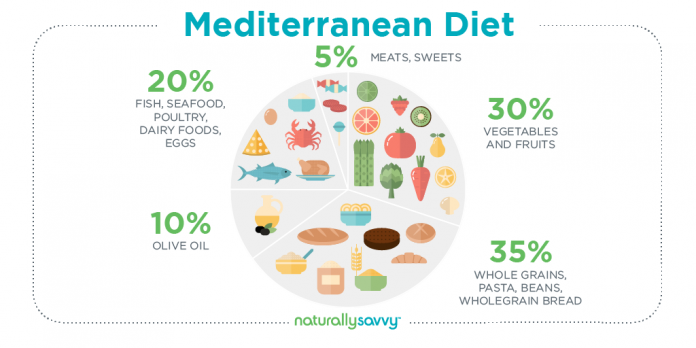
The Mediterranean Diet had been ranked the best diet in numerous categories year after year and is recommended by many doctors and health organizations, including the American Heart Association. It has an extensive list of health benefits associated with it, it tastes great, and it is easier to maintain long-term than some other more restrictive diets. The big question is, if you’re not already following the Mediterranean diet, why not?
What is the Mediterranean diet?
The term “Mediterranean diet” is generic and refers to the traditional dietary habits of the people living in the Mediterranean Sea area. Although the eating styles are not the same among the countries that make up the Mediterranean area, there are many common factors.
Basically, the Mediterranean diet focuses on fresh, unprocessed foods rich in fruits, vegetables, whole grains, beans and legumes, nuts, seeds, and olive oil. Add in some lean protein, small amounts of red wine (okay but not required), and you have what some call the world’s healthiest diet.
In fact, according to Steven Masley, MD, physician, nutritionist, author of The Mediterranean Method, it’s the “easiest diet on the planet to follow that is fantastic for your health.” It’s been “number one for preventing diabetes, for helping your brain, and in the last 3 to 5 years, it’s been either number one or number two every year for your heart.”
Read about healthy diet plans to try.
What foods are included in the Mediterranean diet?
Here are the foods you can enjoy when following the Mediterranean diet:
- Fruits and vegetables, including potatoes. Fresh and organic are recommended over conventionally grown, frozen, or processed.
- Whole grains, including items made from them such as pasta, bread, and crackers.
- Beans and legumes, including lentils, split peas, all types of dry beans, peanuts, and peanut butter.
- Seeds and nuts, preferably raw or unprocessed, and foods made from them include nut butter and tahini.
- Olive oil for cooking and adding to dishes and salads. Extra virgin is preferred.
- Lean protein from fish, poultry, low-fat dairy, and eggs in low to moderate amounts.
- Red wine, in moderation and with meals.
The Mediterranean diet also has a social component, so it’s also important to enjoy meals with family and friends when possible.

Foods to avoid on the Mediterranean diet
Basically, you want to avoid:
- Processed or packaged foods, which contain preservatives, artificial colors and flavors, and other chemicals.
- Fast foods.
- Refined grains, such as white pasta, white bread, and other foods containing white flour.
- Foods with added sugars, such as sodas, candies, and baked goods.
- Deli meats, bacon, and other processed meats.
Health benefits of the Mediterranean diet
In 2021, the US News and World Report named the Mediterranean diet number one best overall diet on the planet, number one for health (tied with DASH), number one plant-based diet, number one for diabetes (tied with Flexarian), number one for heart health (tied with DASH and Ornish), and the easiest diet to follow. It’s also the best diet to adopt if you want to help prevent memory loss.
One reason for all of these benefits is that the diet focuses on anti-inflammatory foods. Inflammation is intimately related to many of the most serious medical problems, including heart disease, high blood pressure, obesity, arthritis, Alzheimer’s disease, asthma, and more.
Read about how to lower blood pressure naturally.
In a 2019 extensive review, for example, a team of international experts reported that the data from Mediterranean diet research showed that the “available evidence is large, strong, and consistent” and that the diet “is associated with better cardiovascular health outcomes, including clinically meaningful reductions in rates of coronary heart disease, ischemic stroke, and total cardiovascular disease.”
Weight loss and the Mediterranean diet
If you’re looking for a diet that can help you lose weight and still taste great, and keep you satisfied, then the Mediterranean diet wins that contest. It’s been shown to be effective at helping people lose weight plus has added health benefits.
According to numerous clinical trials, following the Mediterranean diet is as effective as a low-carb diet for losing weight and more effective than a standard low-fat program. As a bonus, people who followed the Mediterranean plan showed more improvement in blood sugar levels, blood pressure control, and cholesterol levels than a low-fat or low-carb plan. They also were able to keep the weight off throughout a one-year follow-up period.
Bottom line
The Mediterranean diet provides a wealth of great-tasting, nutritious foods that promote and support health and well-being. Countless numbers of recipes and tips are available online and in print, for you to access and enjoy. Always consult a health professional before making changes to your diet.











